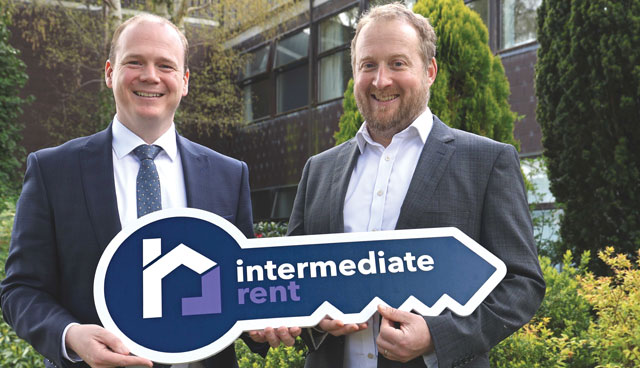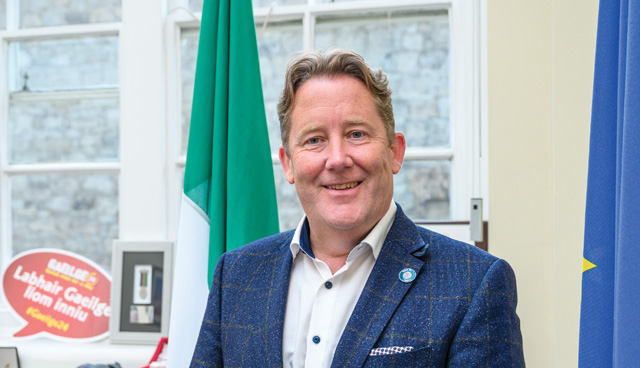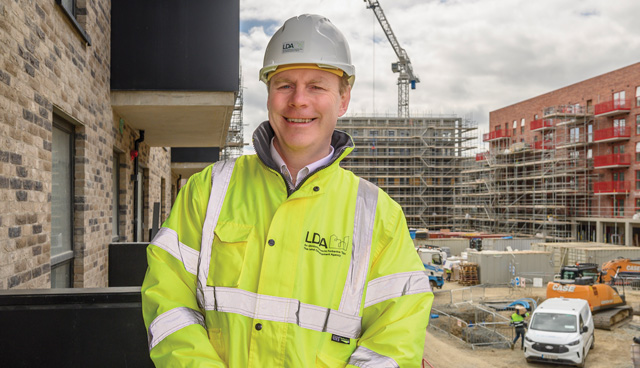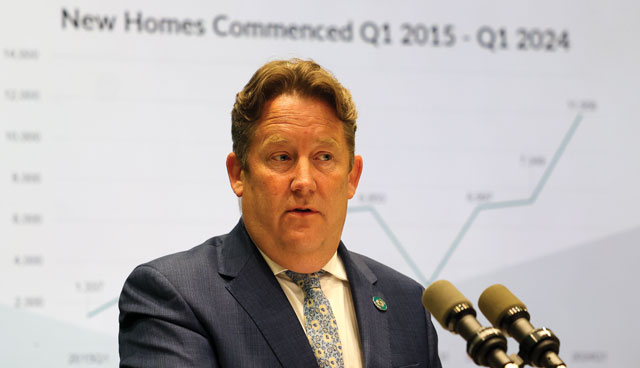
What the Energy Performance of Buildings Directive means for housing
4th July 2024
Circle VHA: Landmark direct construction provides 47 homes
4th July 2024Northern Housing Minister Gordon Lyons MLA: Housing priorities

The North’s new Minister for Communities, Gordon Lyons MLA, outlines his strategic priorities, including the finalisation of a long-awaited housing supply strategy.
The Department for Communities has a broad remit of responsibilities – from languages to heritage, sport to culture, benefits to building safety, arts to poverty.
Within its spectrum of diverse issues are many of the foundations which support and enrich people’s lives.
Housing is a significant aspect of my department’s work, and I have stated this will be a key priority for me. This has been reflected in the range of visits, meetings and events I have attended as Minister.
In my engagement with the Housing Executive and housing associations, I have seen the passion and dedication which exists – the organisations doing fantastic work, and the outstanding staff who are focused on delivering.
It has also been my privilege to be welcomed into people’s homes. Hearing first-hand from individuals about the range of services we support – and the profound difference that high-quality housing makes.
Yet, I am acutely aware of the challenges we face, the realities of the budget position, and the housing situation in other locations, where problems have escalated to the point where the entire system is under significant strain. I am determined to address this and deliver in this area.
It was with this in mind that I outlined my housing priorities.
These are to:
- bring forward a Housing Supply Strategy;
- put the Housing Executive on a more sustainable footing;
- build more social and intermediate homes;
- improve the response to homelessness; and
- protect the Supporting People programme.
“It is vital that, as a society, we recognise the value of social housing as a public good and a long-term investment in our infrastructure and our economy, as well as a means of addressing housing need.”
Minister for Communities, Gordon Lyons MLA
Housing Supply Strategy
I will shortly complete work on a detailed and comprehensive Housing Supply Strategy. The challenges that face us occur across the whole housing system and the solution will require action across Executive departments. This must be a cross-departmental strategy, and I will bring this before the Executive for approval very soon.
Housing Executive
Efforts have been ongoing for a number of years to put the Housing Executive on a more sustainable footing. I am determined to get this done. I am actively pressing this issue with the Northern Ireland Executive and the UK Government, to get a result which will enable the Housing Executive to deliver much-needed investment in its homes, and even begin to build again, above and beyond its innovative six-home passive house pilot project, which is expected to complete this summer.
Social and intermediate homes
I have outlined my disappointment that this year’s capital funding allocation does not allow me to deliver the 2,000 new social home starts that are needed this year. My department has received a significant capital budget, but most of that is required to fund the completion of homes started in previous years.

Northern Ireland’s Housing Minister Gordon Lyons MLA and Department for Communities Director of Housing Supply Policy, David Polley, launch the Intermediate Rent Scheme, an initiative which aims to supply 300 homes at rents below the market rate.
Around 5,700 social homes are currently under construction, with 1,400 of those expected to be allocated to people on the waiting list this year. But the impact of this year’s funding shortfall will be felt by people on the waiting list next year, and the year after that.
An additional £20 million for new starts in the Executive’s June monitoring allocations is welcome news.
Yet, using all the options available to me, my department, with the Housing Executive and housing associations, we are likely to be severely constrained in the number of new starts we can afford. That has consequences for our construction sector, our social landlords and most importantly, the growing number of households in need of social housing.
It is vital that, as a society, we recognise the value of social housing as a public good and a long-term investment in our infrastructure and our economy, as well as a means of addressing housing need.
I have focused attention on other types of affordable housing other than social housing. Co-ownership has helped more than 33,000 families into home ownership over 45 years. I will work to secure long-term funding for it over the next year. I am particularly interested in innovative models to help families on lower incomes who cannot access social housing, such as intermediate rent. I was very proud to launch the search for an intermediate rent operator recently, and I look forward to seeing the development of this new type of affordable housing over the next few years.
Homelessness
I want to prevent homelessness wherever possible and ensure homelessness is rare, brief and non-recurrent.
We have an immediate issue with the use of non-standard temporary accommodation. That is children not near their schools, people away from families and support networks, and people unable to get to work. This is not good for families who need the security of their own homes, and it is very expensive.
Work is ongoing with the homelessness sector, civic society, statutory organisations and residents, with the involvement of government at all levels, to identify issues which cause homelessness and to find ways to address them. I am particularly interested in the development of the ‘Complex Lives’ approach lead by Belfast City Council. This is long-term work to fundamentally change systems which give rise to homelessness, and to change our response to it. However, the short-term focus must continue to be supporting those currently in crisis, and I commend the organisations involved in this effort.
Supporting People
The Supporting People programme has an extensive reach across our society: it helps older people to thrive in sheltered accommodation, people with disabilities or mental health issues who need support to live independently, young people who have had a difficult start in life, and people who need support to help them out of homelessness.
The public and voluntary sectors have a lead role in delivering these housing support services, which, in turn, have a preventative function in keeping people out of hospital or institutional care. These are services to be proud of, which is why I have prioritised the programme for additional budget both last year and this, in recognition of increasing costs.
Additional funding in the June Monitoring round for both the Supporting People programme, and homelessness interventions, underlines the cross-departmental commitment to addressing these issues.
Looking forward
I am aware that housing impacts our whole society and our economy. Adequate housing is a collective effort which involves government at all levels, a broad range of stakeholders, and – perhaps most importantly – the communities themselves.
We have invested significant sums in new build homes, in recognition of the difference that good quality homes make to people’s lives. Yet, I acknowledge the scale of the housing need which exists in our society and that it is a problem which will grow if we do not make the right interventions.
I fear that we will be dealing with constrained budgets for the foreseeable future, and the status quo just is not acceptable. Clearly, we need to do things differently – and uncover new solutions. The challenge is to find innovative and radical approaches to the problems we face. This conversation is taking place with a range of stakeholders in both the public and private sectors.
Intermediate rent, which will deliver homes for rent at below market rates, is one example of this. Work is ongoing to identify and develop other ideas, with input from across the sector.
There are no quick or easy fixes, and a collective, collaborative effort is required in order to make a lasting difference. It is my hope that we can direct this effort in new ways, and develop creative solutions to our housing issues, for the benefit of the people of Northern Ireland.






